2024-06-03
Peanut butter is among the favorite foods of many people! Thanks to its creamy and delicious texture and nutty flavor, it has found its way into our dietary routine as a popular ingredient in sandwiches, snacks, desserts, and treats!
What about our paw friends- do they enjoy peanut butter the same way humans do? Yes, they love peanut butter! It has even been used as a distraction tool for some dogs who do not enjoy bathing or other activities they find unpleasant.
However, here arises the question- is peanut butter safe for dogs? Let’s explore its benefits and potential risks it may pose for a dog’s health, and the proper way to incorporate it into our canine’s diet.
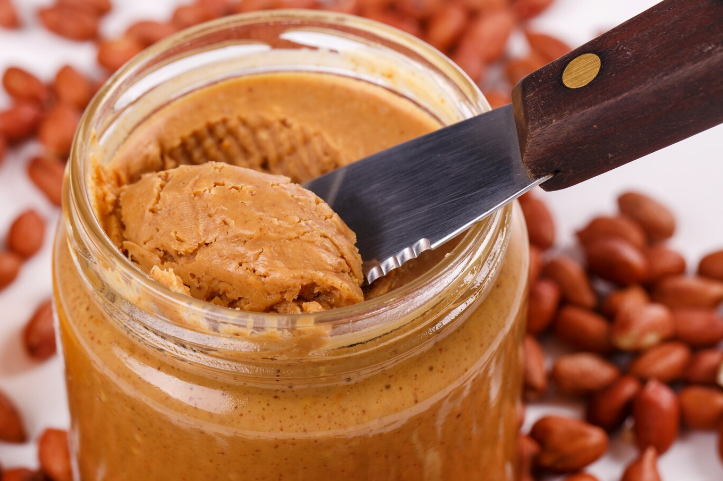
The short answer is- Yes, they can. Peanut butter has many healthy benefits for dogs but should be given in moderation.
A small amount of peanut butter can be a delicious treat, that you can use as part of training sessions for a great performance; as a motivation tool to encourage your furry friend to show specific behavior; as a treat to redirect their attention while giving them a nice bath or grooming them; or just as a gesture of love and care, as dogs are our most loyal friends and supporters!
As a general guideline, you should limit the intake of peanut butter to no more than 1 teaspoon per day for small dogs and 2 tablespoons for larger dogs. However, the amount should be adapted to your dog’s weight, age, and health.
Puppies, adult dogs, and senior dogs have different nutritional needs. Moreover, the presence of certain medical issues or genetic predispositions may require you to be more mindful of the food you are feeding your canine.
We would advise you to consult a veterinarian on how much peanut butter would be safe and beneficial for your dog to eat, based on their specific needs.
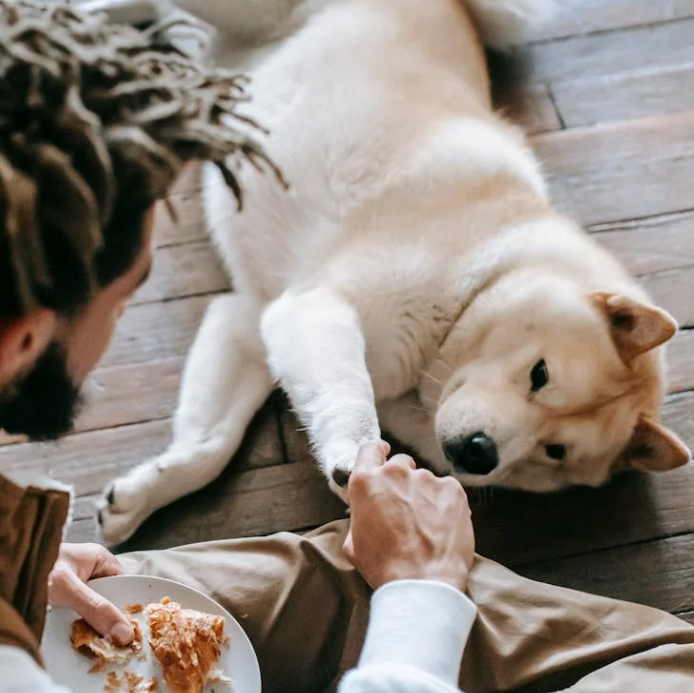
Peanut butter can have many nutritional benefits for dogs, and promote health.
It is high in protein, which is beneficial for muscle growth and cell repair. It also plays a crucial role in supporting the immune system and the process of generating antibodies and enzymes in the body.
Peanut butter is also a good source of healthy fats, which are mainly monounsaturated and polyunsaturated. They help improve the overall well-being of your furry friend, including the appearance of their coat and skin. Additionally, they contribute to reducing bad cholesterol levels and lowering the risk of heart disease.
Moreover, peanut butter contains many vitamins and minerals, among which are Vitamin E, Vitamin B3 (niacin), Vitamin B6 (pyridoxine), Vitamin B9 (folate), magnesium, phosphorus, potassium, zinc, and copper.
Does your paw friend need some energy boost? A small amount of peanut butter may work perfectly! It is calorie-dense and will help your dog recover their energy after a long day of running and chasing. It could be a good addition as a snack for energetic dog breeds like the Border Collie.
Why not use peanut butter as a distraction? If your paw friend is uncooperative when giving them medication, taking them under the shower, trimming their nails, or doing anything of which they are not fond, some peanut butter may come in handy!
Last but not least, peanut butter treats may become your dog’s favorite during training sessions, especially if you expect them to do a more challenging task. There is nothing better to motivate your furry friend to show a desired behavior than a delicious treat (especially if they are food-motivated).
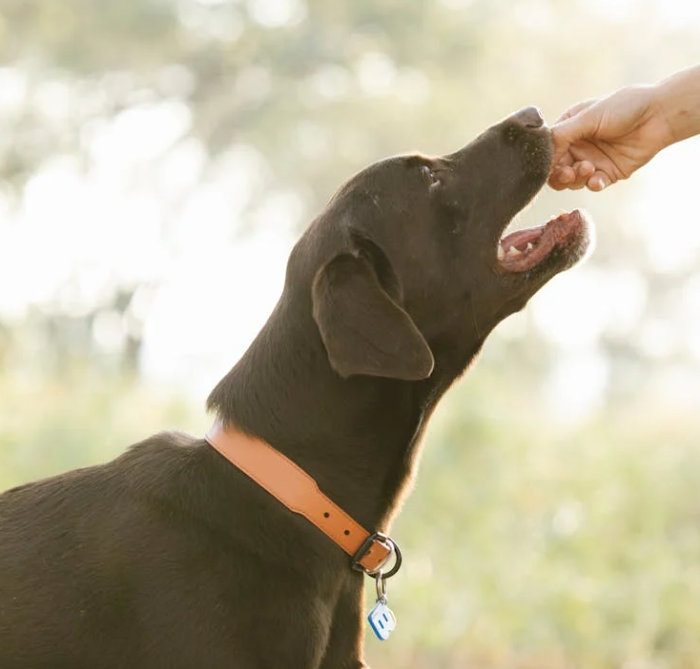
While peanut butter can have many nutritional benefits for our paw friends, there are also potential risks it may pose for their health, especially if not given in moderation.
Many commercial peanut butter brands contain additives like sugar that are not healthy for dogs. Sugar substitutes like xylitol are even more toxic and cause severe health conditions like organ failure and hypoglycemia.
Carefully reading the labels, checking the ingredients, and making sure to avoid certain additives and substitutes are crucial for your dog’s health!
While it can boost your paw friend’s energy, the calorie-dense content of peanut butter can lead to weight gain and even upset your dog’s stomach, if it is more sensitive. Regular consumption of peanut butter and fatty foods may lead to obesity, which, in turn, can cause or worsen more serious health issues, including joint problems (arthritis) and diabetes.
If your paw friend has digestive issues and health conditions like pancreatitis (inflammation of the pancreas), the consumption of fatty foods can worsen them too.
Overconsumption of peanut butter can lead to gastrointestinal issues, including diarrhea and vomiting, especially if the peanut butter contains additives like sugar or salt.
Some dogs may be allergic to peanuts or develop allergies over time. Symptoms of an allergic reaction can include itching, redness, swelling, and digestive issues (diarrhea and vomiting).
It is necessary that you observe your dog after peanut butter consumption and be mindful of any of these symptoms. If you are not sure whether your dog is allergic or not, give them a very small amount as a test first.
Peanut butter can be sticky and pose a choking hazard, especially if you give it to your paw friend in large amounts.
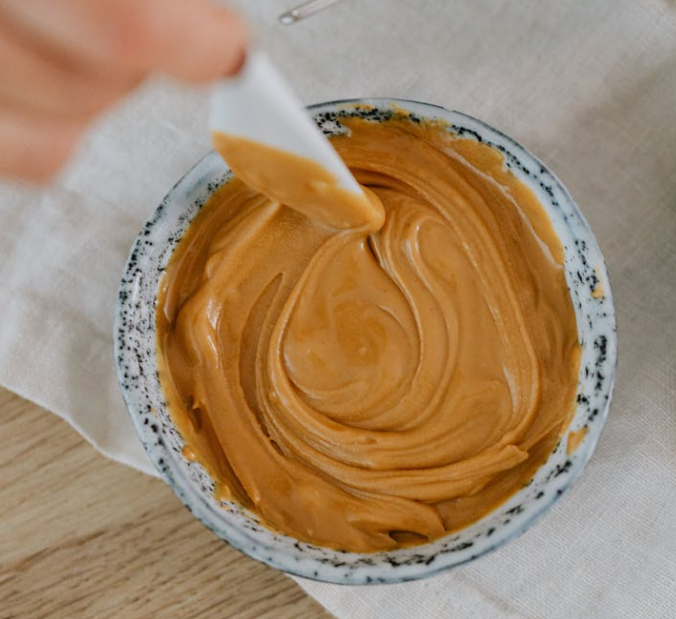
If you have decided to incorporate peanut butter into your dog’s food or just occasionally give it to them as a reward, make sure to do it safely and gradually. We have listed several tips on how to ensure that your furry friend will have a positive experience eating peanut butter.
Begin by offering your dog a pinch of peanut butter to observe their reaction and take quick action if needed. If your furry friend seems to enjoy and tolerate it, you can gradually increase the amount by not exceeding a teaspoon per day (for small dogs) and two teaspoons per day for large dogs. It is also recommended that you divide the amount into portions throughout the day; for example, half a teaspoon in the morning and another half in the afternoon.
Keep a close eye on your dog after they consume peanut butter for any signs of allergic reactions or digestive upset. As mentioned above, common symptoms of food allergies in dogs include itching, redness, swelling, vomiting, diarrhea, or changes in their stool.
Choose natural peanut butter (without preservatives and sweeteners) to ensure it won’t negatively affect your dog. Peanut butter that is high in salt should also be avoided. We will emphasize the importance of avoiding xylitol, which is highly toxic for dogs.
A good way to introduce peanut butter to your furry companion is by offering it as a reward for showing wanted behaviors and being well-mannered. For instance, if your dog fulfills a given command or remains calm and focused on the presence of distractions like other animals or people, a delicious peanut butter treat can be used as a high-value reward.
Do not forget to keep track of the amount of treats your dog receives and make sure they do not exceed 10% of their regular food.
Homemade dog biscuits or frozen treats are a great way to control the ingredients and ensure that your dog will eat healthy and natural food free from additives and supplements. There are many recipes available online for peanut butter dog treats, allowing you to customize the ingredients so they best suit your dog's dietary needs.
If you are concerned about the calorie or fat content of peanut butter, you might consider using it sparingly or exploring alternative treat options, such as fresh fruits or vegetables.
Make sure they are also safe for dogs. For instance, grapes, avocados, and onions are very toxic to dogs.
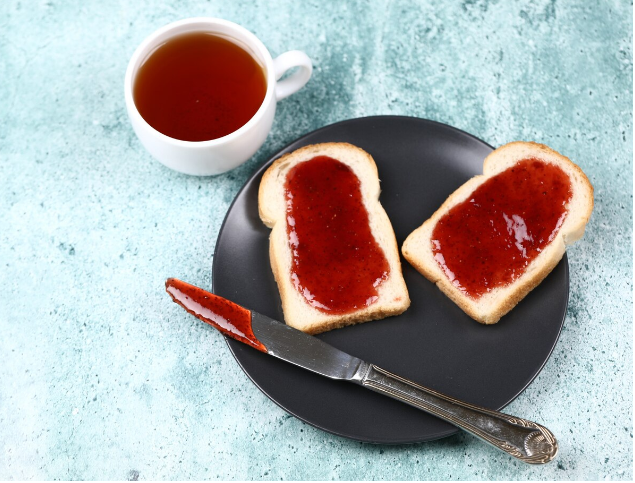
We got hungry, only thinking of how delicious a sandwich with peanut butter and jelly is! If you are also into this amazing combo, you might consider giving a taste to your dog as well.
Be careful! While peanut butter itself is safe for dogs when given in moderate amounts, jelly often contains added sugars, artificial flavors, and other ingredients that may be harmful to your dog’s digestive system.
Excessive sugar intake can lead to obesity, dental problems, and even diabetes in dogs. Additionally, some canines may have sensitivities or allergies to certain fruits commonly used in jelly. As explained above fruits like grapes are highly toxic to dogs.
Last but not least, the bread used in sandwiches may contain ingredients like wheat, which can be difficult for some dogs to digest, especially those with allergies to gluten. Also, bread adds unnecessary carbohydrates to your dog's diet, which can contribute to weight gain if consumed in larger amounts.
Peanut butter can be a safe and delicious treat for dogs when given in moderation and with careful consideration. Whether you opt for traditional peanut butter or explore alternative peanut-based treats, there are plenty of ways to incorporate it into your dog's diet while ensuring their health and well-being.